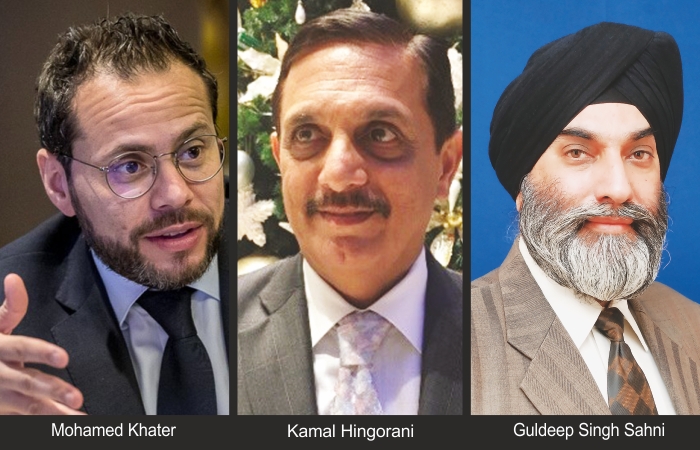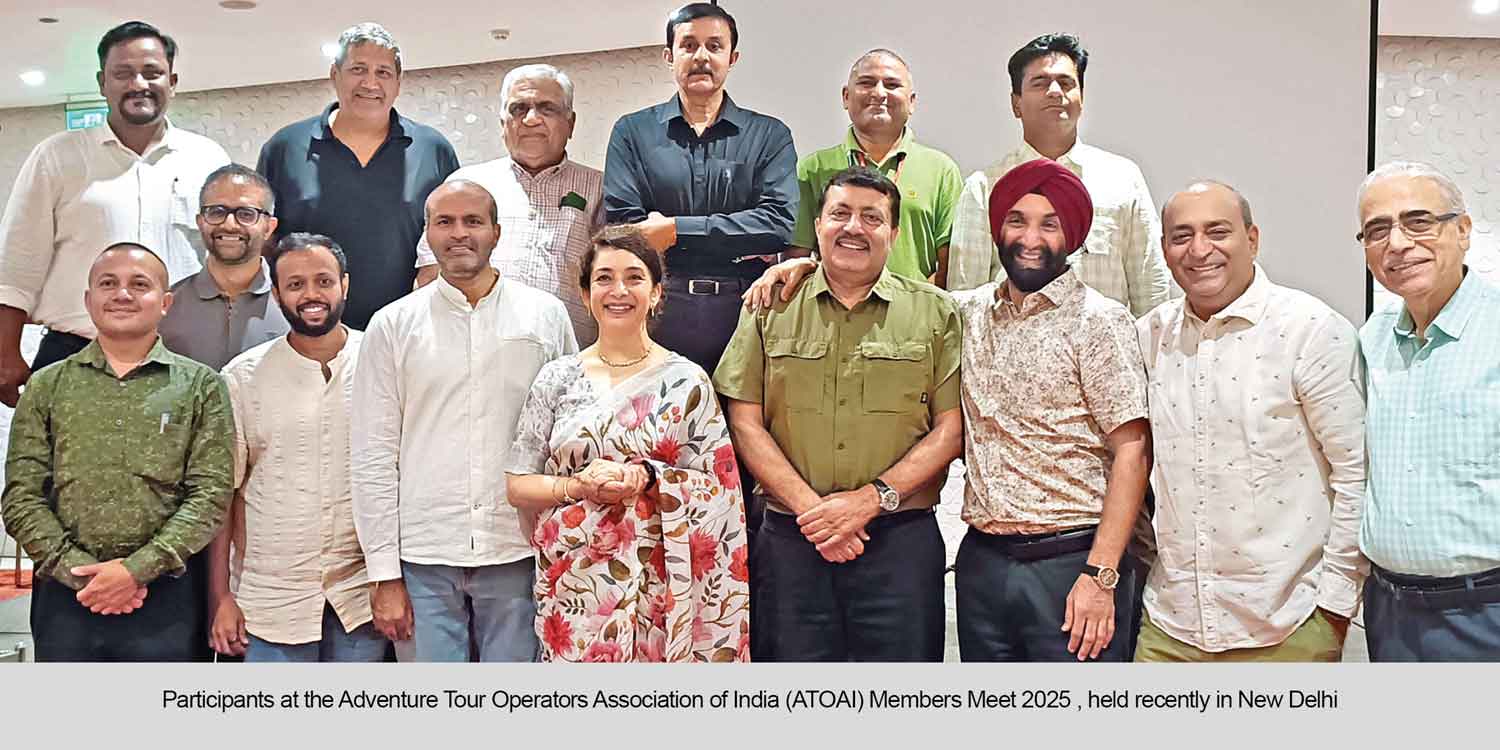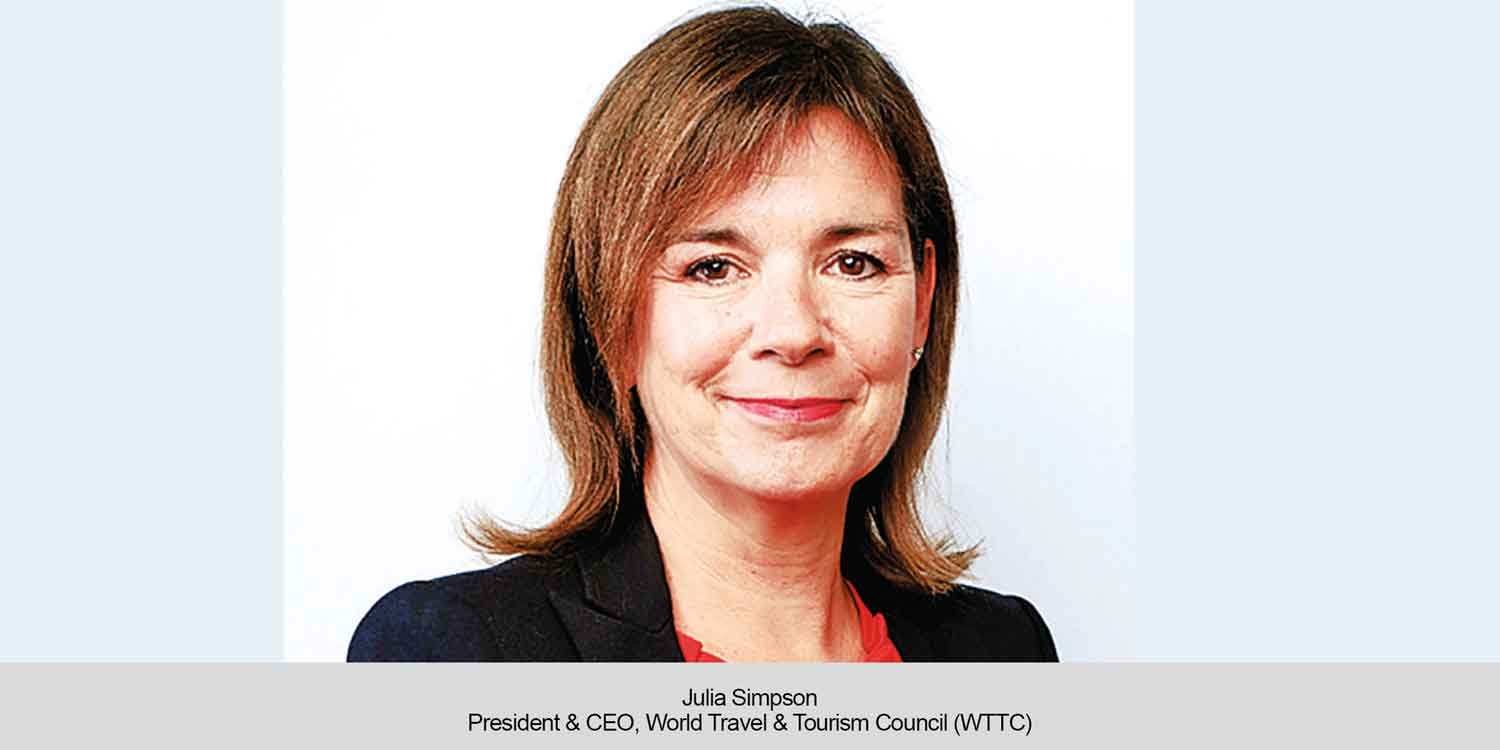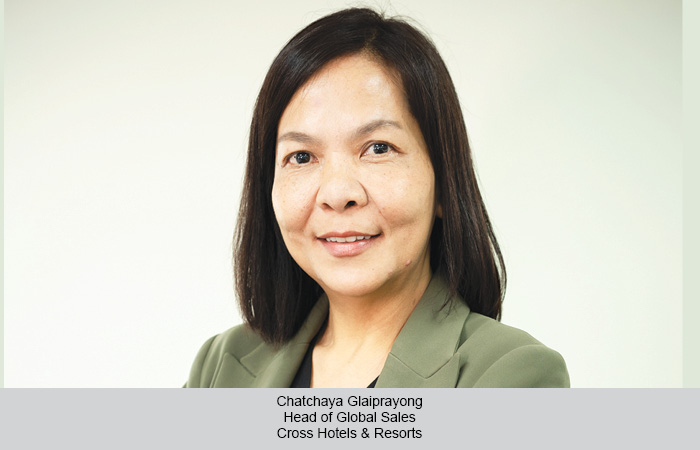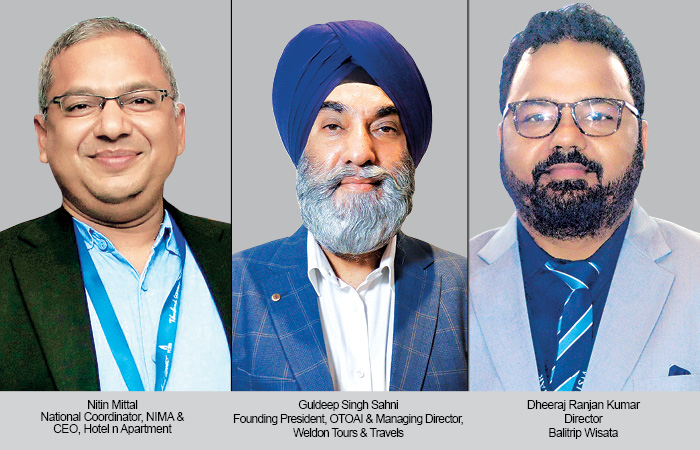The second session of the 4th TRAVTALK Digital Conclave, titled ‘What will the travel restart look like? Managing Customer Experience’, had experts from across the board – NTO, airline and the tour operator – to work on revival in a calibrated manner, how working together is important and most important of all, bringing back the confidence of consumers in travel. Harmonised approach for revival
Manas Dwivedi
Echoing a common agenda of joining hands and working together for revival and the future of the travel industry, panellists at the session, Mohamed Khater, Director – Destination Tourism Development, Ras Al Khaimah Tourism Development Authority (RAKTDA); Kamal Hingorani, Chief Customer Officer, SpiceJet and Guldeep Singh Sahni, Managing Director, Weldon Tours & Travels, also shared prominently that working towards restoring the consumer confidence to restart travel should be the prime focus apart from the use of Artificial Intelligence in varied segments of the industry.
Sharing his view, Khater said, “Tourism will be always a reality and there is an appetite for travel with a cautious, positive and confident approach from travellers to drive it back. So, we do expect things will be better in the short-term and the long. From our end, Ras Al Khaimah is ready to welcome travellers and ready to implement several campaigns, packages and actions to be ready to work with our travellers either domestically, regionally or internationally.”
Hingorani, on the other hand, said that the perspective of the industry of tackling crisis is in the past. “When 9/11 happened, it impacted the customer confidence across the globe, but prominently impacted the US and Europe. Business was not impacted, but what was hit the most was passenger confidence, which went down across the globe because everybody thought that a machine like an airplane can become a missile anywhere in the world. If it could happen in the US, it can happen anywhere. After the tragedy, security protocols were rewritten as fear gripped all travellers across the world. The whole world came together, and governments set up a security protocol that has held us in good direction. With a pandemic like COVID-19, the health and safety protocols are again being rewritten. Innovation is undoubtedly the way forward. My fervent request to all my colleagues in the industry is – let us restore public confidence,” he said.
Pitching the thought to work for a better future, Sahni said that we need to look beyond the pandemic now. “It is time to now look at the future. As soon as international flights begin, we would start looking at travellers. Front liners out of that would be VFR and business travellers. We will start looking at people who have a necessity to travel. Once they start, front liners will start and then the rest will come along. During such crisis, airlines and hotels had started reaching out to customers directly because they needed to cut costs. With time, they will start looking at more business arms and devising new strategies. They would again want to reach out to tour operators to boost their business, so that more people start selling their products and there is revival in a faster manner,” he said.
Air travel is safe and secure
Asserting that air travel is the safest mode of transport currently, Hingorani said that building consumer confidence is one of the most important things to revive tourism. “This is something that we, as airlines, cannot do alone. It must come from the entire ecosystem, from the entire tours and travel community, from hotels, from the airports, from everybody. People are saying that you cannot maintain adequate social distancing in an aircraft. WHO has certified that the air circulation in an aircraft flows from top to bottom, like a vertical curtain. The entire air in every aircraft gets recirculated every 2-3 minutes and because it moves like a curtain from top to bottom, it does not move backward or forward. Irrespective of where you are sitting, even if you have three passengers sitting adjacent to each other in Economy Class, there is no way that air droplets can move from one passenger to the other, unless somebody actually sneezes into the face of another passenger, which is highly unlikely. In fact, WHO has confirmed that the sanitised air in the aircraft is of a higher level of sanitisation than even hospital operation theatres. There is not even a single case of evidence till now that any contagion has happened in the aircraft from one passenger to the other, because of the closed environment or the air,” he said.
Hingorani added, ““In the Indian skies, you wear a mask and a shield so that your eyes also get covered. I think these are adequate measures for air travel. In fact, it has been proven that an aircraft, from a health perspective or from a contagion perspective, is far more sanitised than any other public transport today. We do not charge the customers anything for the safety kit because we actually want the customers to come back, gain that confidence and get more people to start flying. IATA projects that 2020 will have 47 per cent of 2019’s revenue passenger kilometres which, in the current environment, should be a wonderful thing to talk about.”
Right time to restart business?
The way people travel will change and new strategies should be framed keeping in mind consumer confidence, is an opinion shared by many in the industry. “People will prefer nature tourism or wildlife tourism or maybe going to a resort to relax. Airports will be less crowded; it may be good news for many people, but travellers will avoid going to a train or bus stand. They will prefer to travel by themselves in their car. When more and more people get to know that air travel is the safest means of transport, they will travel more.
The hotels might get cheaper or they might come with better options since the market is going to be sluggish for some time. Even on overseas trips, people would like to choose a road trip. Lockdown has certainly slowed demand, but some people have already started looking at cycling vacations or activities like walking, sailing, hiking, fishing, etc. All these things are going to be in trend and a tour operator has to be ready with it. Airlines and hotels should start giving certain benefits to tour operators on postponements, cancellations, or early check-ins. We are all looking at a collective effort from all stakeholders; it cannot be done alone, and tour operators, hotels, NTOs and airlines also have to pitch in. Time has come now to work together. There is a long list of demands we have, maybe we can create a document out of it.
It is disappointing that the industry has not received any direct support from the government, but I am hopeful that a united industry can overcome this challenge. I also wanted to look at the future, which is bright. Let us just work together,” he said.
SOPs for beach and pools
During the webinar, Khater informed that Ras Al Khaimah has also put in place SOPs for going to public beaches and accessing pool areas in hotels. “We wanted to maintain the same guidelines, which we have implemented within the hotel territory, to the public beaches as well in Ras Al Khaimah,” he said.
Future of students in aviation
Regarding students in the aviation sector, Hingorani feels that we have been pushed back by about two years in India. “That is purely my personal take. I strongly believe that aviation will come back with a bang by October-November this year. But, from a student’s perspective who is talking of jobs in the industry, I think we have gone behind by two years, unfortunately. There is very little that we can do about it. We have to all work together towards it,” asserted Hingorani.
COVID-19 test before boarding a flight?
Hingorani feels that such norms will not be required for domestic travel since we already have a very stringent protocol in place by DGCA and various state governments. “Quarantine measures are already in place. For international travel, like the state governments, it will all depend on what other countries really want. When the borders actually open, let’s assume in July, we will get to know. I believe that whichever country opens up will not have a standard protocol for every nationality. It will be which country you are coming from and that is the basis of what protocol you will have to follow. For example, Singapore’s Changi Airport already has a green lane in place for passengers going to China from other parts of the world where they are operating. So, they do not mix them with any other passenger. Every airport will have to design a protocol, depending on whether they are a transit airport, a hub airport, or an origin destination area basis where the passenger is coming from,” he said.
The ‘short-cation’ campaign
Khater shared that RAK has launched a ‘short-cation’ campaign. “It’s a very new concept, where basically people tend to say staycation, but we are calling it a short-cation and with this, we want to make sure to leverage the length of stay of travellers and at the same time think about ADR. With this campaign, guests can stay for three nights at participating hotels and they will be able to get a destination activity and also get a weekly raffle and a grand raffle. Currently for domestic tourists, once international flights come to the UAE, we will be glad to welcome international tourists as well,” he said.
Robots in cabin crew?
According to Hingorani, the cabin crew in the aircraft currently is like a robot only. “Dressed in a white PPE suit from head to toe, not serving much to the flyers and only attending with water requests. They have become impersonal as far as possible because of the present condition and I do not really like it. So, I would not want ever in my lifetime to see robots on board because of the hospitality services. It is all about personal service and being hospitable to passengers,” he said.
How will AI change tourism?
In his closing remark, Khater said that in the whole industry, we need to focus on restarting business and going on the path of recovery; the government and the travel industry need to work together. “World organisations like WTTC, UNWTO and other are creating global protocols. Being a member of these associations, we have been able to shape a global travel policy, the priority focus area in which is tourism recovery. I would like to mention four main points here: we need to provide liquidity in the industry and protect jobs; we need to build confidence for the safety and security, starting from transportation, airport, airline, hotels, destination activities; we need to work on public and private collaboration for reopening and reassuring visitors and travellers coming to the destination; we need to look at reopening the borders responsibly because it is crucial to make sure we have a proper and responsible restart for the tourist, which I feel very positive will happen soon. Artificial Intelligence will be part of the industry. This is something we cannot hide, but how strongly it will impact our industry and the business, it must be seen and will take some time. I think, we still need to work on our relation, our communication and our interaction in order to build the confidence and trust with the business, and then gradually see how Artificial Intelligence will help and support us,” he said.
In his closing remark, Hingorani agreed that we must build consumer confidence first. “The International Civil Aviation Organization (ICAO) is taking the lead on this. Artificial Intelligence will be part of it. ICAO has formed a Council Aviation Recovery Taskforce (CART), which includes IATA and WHO and various stakeholders from the industry. It also has UNWTO and WTTC part of it, working together towards mitigating the risks of what we are facing and how we can have a very clear exit strategy very soon. We are already working on an exit strategy. So, we may be in the midst of a crisis, but what it needs and what I would like to emphasise is that there has to be a huge industry collaboration, a harmonised approach has to be there. IATA has talked about outcome-based measures towards risk mitigation, supported by scientific evidence, and that’s where AI comes in and they are using AI already. Now, all this maybe temporary to handle this crisis, but all this will be very handy, god forbid, if there is another pandemic in the future so that we are better prepared. It is currently multi-layered bio-safety measures and things like that,” he said.
Sahni feels that Artificial Intelligence is going to be part of our life. “It is going to be used somewhere or the other in our lives, but certainly it is going to be there. As I said earlier, it is time now for partnering together. It is time to come together and partner for the future of the industry. One good thing that COVID-19 has done is that we all have started thinking together. Let us look at the future,” he said.
RAK’s action plan
We have reached out to our partners, stakeholders and business entities, and we have planned with them. We have spoken directly to industry partners, General Managers and owners. We have been doing regular weekly meetings with the Ministry of Economy to leverage a federal support to our sector. Secondly, we created a stimulus package and the highlights of this package was relief measures. We have waived off the tourist licensing fee and provided additional specialised support for the SMEs. We have also formed a steering committee and the main role for this committee is to provide a seamless facilitation of the whole tourism incentive package
– Mohamed Khater
M!CE & Weddings in RAK
“There is still an appetite for doing business in the current situation. We are still receiving a lot of requests for business in Q4 and even Q1 of 2021. We need to keep them updated on all measures we are taking for safety and security. Ras Al Khaimah is flexible in terms of doing business with the weddings and M!CE sector. We have done a lot with that segment and we need to continue maintaining this for moving forward. By July, UAE will announce several guidelines for travelling of tourists in the country. The amendments and new regulations will depend on each country and each event.”
– Mohamed Khater
No meals the new normal?
“It is just a matter of time. As soon as the fear of COVID-19 goes away and people start travelling a little bit more normally, am sure that the F&B service will come back, even on long-haul flights. For example, on the Vande Bharat repatriation flights operational between India and the US, there is a pre-pack meal box being given. So, it is not that food is not there. It is just a matter of unavailability of a hot meal service at the moment, and beverages. We only have to wait until normalcy returns”
– Kamal Hingorani
When is M!CE tourism expected to restart?
“M!CE tourism within India will start very soon, I think by end of this year. Overall, once leisure travel starts, VFR will follow and then, business travel. Then, maybe M!CE tourism may start by next year. We will be really lucky if it begins by end of this year. While I cannot predict what may happen, the way things are going (I have heard that the virus is weakening), if it is true, then definitely it is on our side.”
– Guldeep Singh Sahni
Top 3 countries to sell in 2020
- New Zealand
- Australia
- Ras Al Khaimah
– Guldeep Singh Sahni
 TravTalk India Online Magazine
TravTalk India Online Magazine




